
Datacenter proxies are the most cost-effective solution for changing your IP address and sidestepping geo-location barriers for any purpose, including gaming and adding a custom IP address to your automation bots or scraping tools.
Proxy servers play a crucial role in web scraping, as the modern world continually requires new data. Most firms require data for various purposes, such as pricing monitoring, sentiment analysis, and price aggregation.
Web scraping is mainly used to gather information from specific websites. However, the disadvantage of utilizing this strategy is that your IP address is blocked. Proxy servers are essential for avoiding restrictions on accessing any website.
What Are Datacenter Proxies?
The role of a datacenter proxy is similar to that of any other proxy: to mediate communication between your device and the hosting server. Other companies that manage massive server clusters are the source of datacenter proxies. These servers generate a large number of IP addresses for datacenters.
Although datacenter proxies are more stable and faster than residential proxies, they are also more easily detected. In most cases, a datacenter will have a faster internet connection than any home, and they are also less likely to have their power shut off than the average residential internet user’s device.
Proxies hosted in the datacenter tend to be more stable and perform consistently since the underlying proxy infrastructure is purchased from another company. If your proxy infrastructure is more trustworthy, managing your business’s expenses will be easier.
Let’s get started with the list of Best Datacenter Proxies.
Top 9 Best Datacenter Proxy Providers
- Oxylabs – Overall Top Pick
- Webshare – fast & affordable
- Smartproxy – reliable and cost-effective
- Bright Data – Industry-Leading Success Rates
- IPRoyal – Market-leading Speed
- Proxy Empire – Lightning Fast
- NetNut – High Performance
- Storm Proxies – Pick for IT services
- Rayobyte – Large Proxy Pool
- Infatica – Ethically Sourced
1) Oxylabs
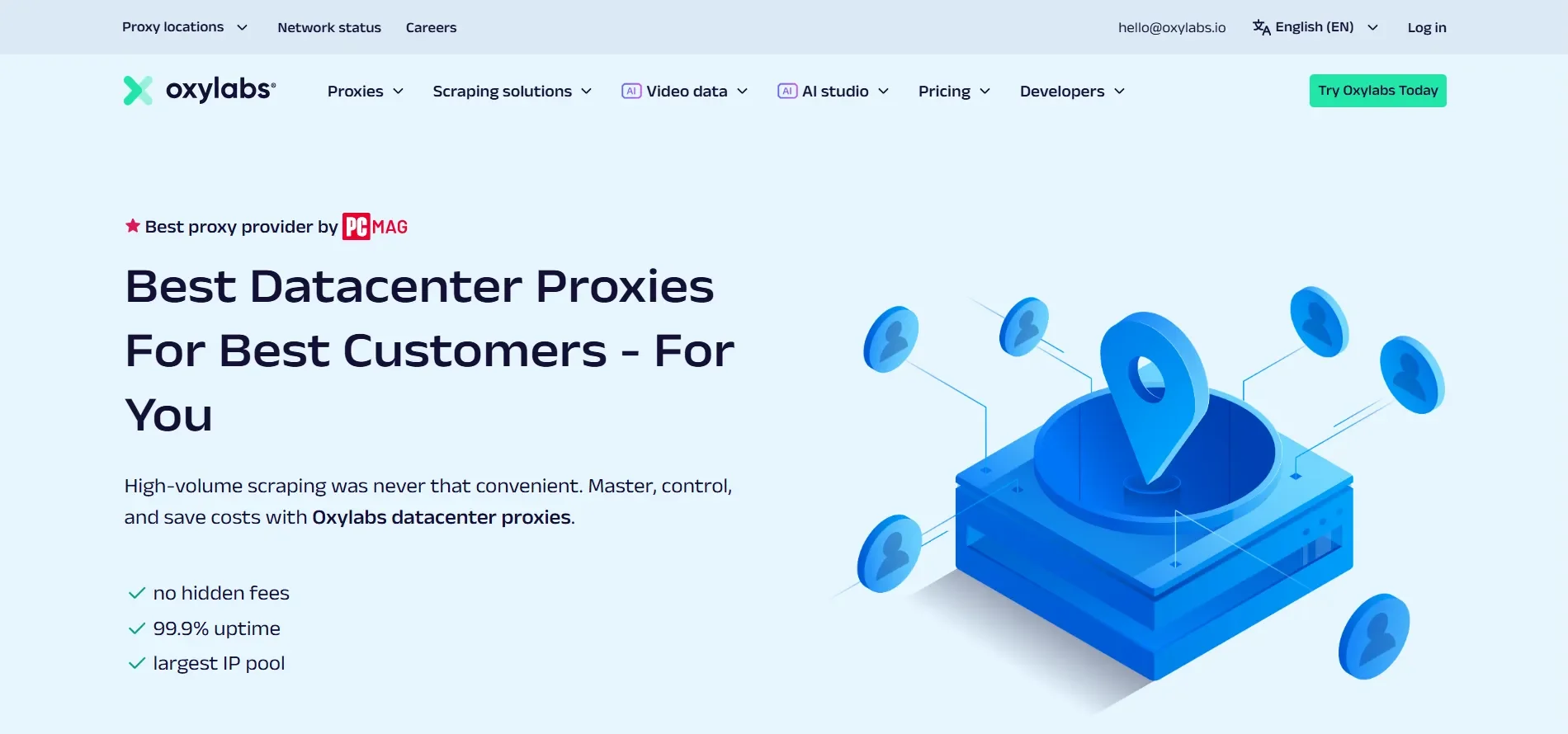
A pool of 42,000 IPs from 30 countries, including the US, Europe, and Asia, is accessible for use with Oxylabs shared proxies. You can replace them each time you log in, or create “sticky sessions” that last for as long as you’d like.
Two million distinct IP addresses are under the datacenter provider’s control. Bans related to your subnet and ASN should decrease. IP addresses targeting specific cities may be assigned to you from 195 different countries.
.Users can cycle sticky sessions with each new connection, or they can last as long as needed. You can choose to pay per IP or per traffic, with plans starting at $12/month that give access to 10 IPs.
Oxylabs Key Features:
- With no hidden costs and cost-effective options, Oxylabs datacenter proxies offer industry-leading success rates and speed.
- With Oxylabs, you may enjoy unlimited datacenter proxies per IP address, fair usage policies, and bandwidth.
- Oxylabs datacenter Proxies may be easily integrated with the most widely used third-party solutions.
- Oxylabs offers transparent pricing and 99.9% uptime
Pricing: Starting at $1.2/IP
Pros:
- Unlimited bandwidth
- High success rates.
- Auto-retry system.
- 24/7 live support
- Dedicated Account Manager.
- Paying for traffic is available with no extra cost for IP
- 5 IPs for free upon registration. No credit card needed
Cons:
- The interface may feel complex for beginners
2) Webshare
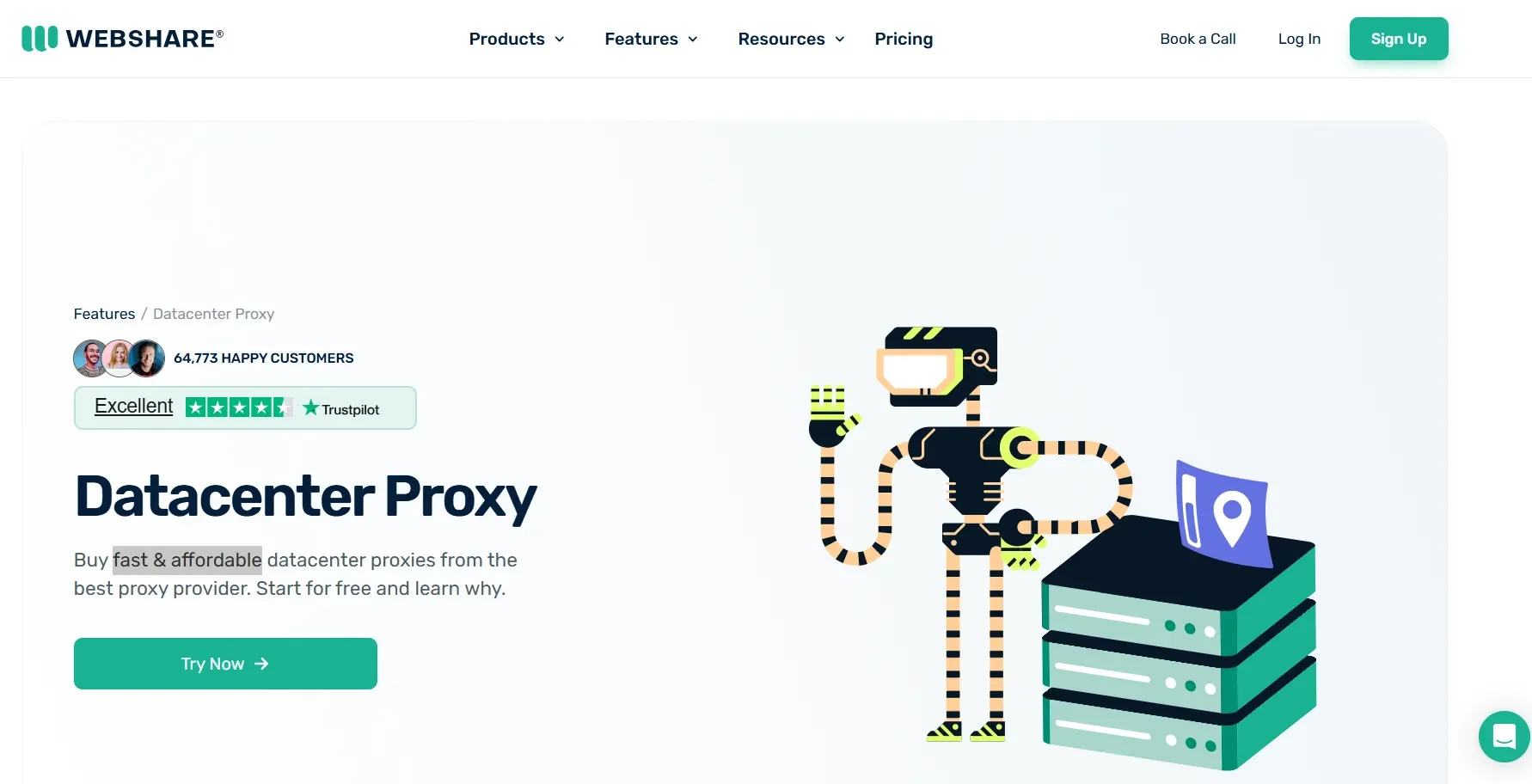
Webshare makes it easy to access fast, anonymous, and secure proxies for any online project. Supporting both HTTP and SOCKS5 protocols, it allows users to create customized proxy lists with 10 free datacenter proxies and 1GB of monthly bandwidth, available indefinitely with no credit card required.
Pricing starts affordably with Datacenter proxies from $0.03 per IP ($2.99/month), Static Residential (ISP) from $0.30 per IP ($6/month), and Residential from $3.50 per GB ($3.50/month), making Webshare one of the most budget-friendly proxy services on the market.
With an aggregate network speed exceeding 100 Gbps and a 99.97% uptime guarantee across more than 50 countries, Webshare delivers consistently fast and stable connections. It’s an ideal choice for web scraping, automation, SEO monitoring, social media management, and other data-intensive tasks that demand high reliability and smooth performance.
Key Features
- let you configure countries, bandwidth, threads, and speed, giving you the flexibility to scale effortlessly as your needs grow.
- Dedicated gigabit lines ensure that traffic remains fast and stable even during peak usage.
- Your privacy is fully protected, and your data is never shared with third parties.
- The service is easy to start with and lets you upgrade only when you are ready.
Pricing: Starting from $0.03/IP ($2.99/month)
Pros:
- Excellent global coverage with more than 50 countries
- Affordable plans that work for every budget
- Strong and reliable datacenter proxy performance
- Scalable options for growing projects
Cons:
- Limited advanced features for very large enterprise users
3) Decodo
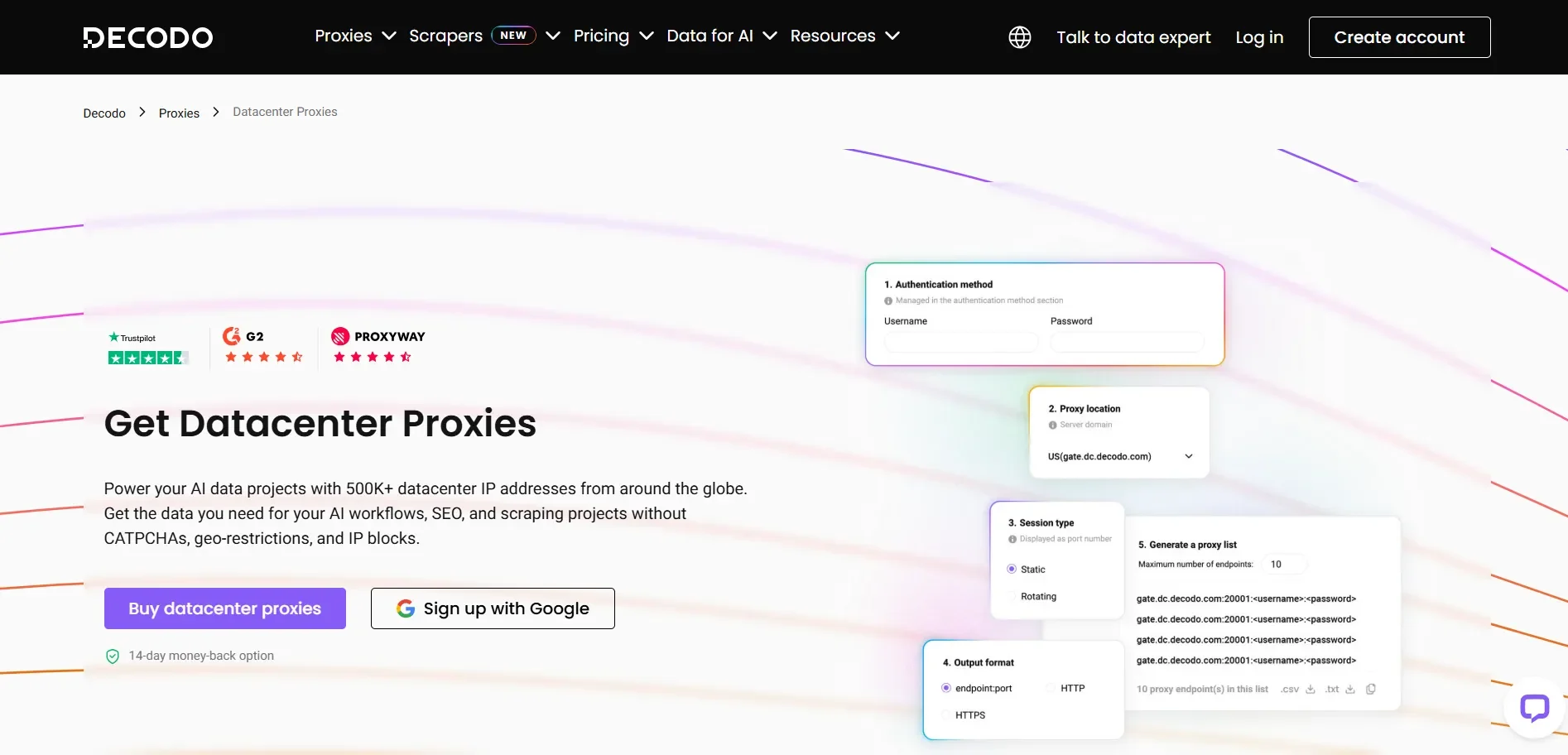
Decodo is an excellent solution for powering AI data pipelines, SEO tracking, and web scraping at scale. With access to more than 500K datacenter IPs across the globe, you can collect the data you need without dealing with CAPTCHA, geo-restrictions, or IP bans. Webshare’s network offers exceptional reliability with 99.99% uptime and response times under 0.3 seconds, making it ideal for developers, businesses, and data professionals.
Covering 15+ countries, including the US, UK, Germany, France, Canada, and Australia, it ensures broad accessibility for any project. A single proxy endpoint simplifies setup and management, eliminating the need to handle multiple proxies. Unlimited traffic plans are available for users handling large-scale data operations.
Key Features
- Single endpoint solution simplifies large-scale proxy management and reduces maintenance overhead.
- Easy authentication via user and password or IP whitelisting enables quick, secure integration.
- Real-time analytics monitor bandwidth, requests, and performance to optimize resource usage effectively.
- High-speed datacenter proxies maintain top download speeds for smooth, consistent operations worldwide.
Pricing: Starting at $0.026 per IP; Pay/GB: $0.50-$0.60/GB
Pros:
- Extensive global IP coverage for better reach
- Fast response times under 0.3 seconds
- Reliable datacenter proxy with 99.99 percent uptime
- Affordable plans with flexible usage options
- Member of EWDCI (Ethical Web Data Collection Initiative)
Cons:
- Rotating IP setup may need an initial learning curve
Read Decodo Review for More Information.
4) Bright Data
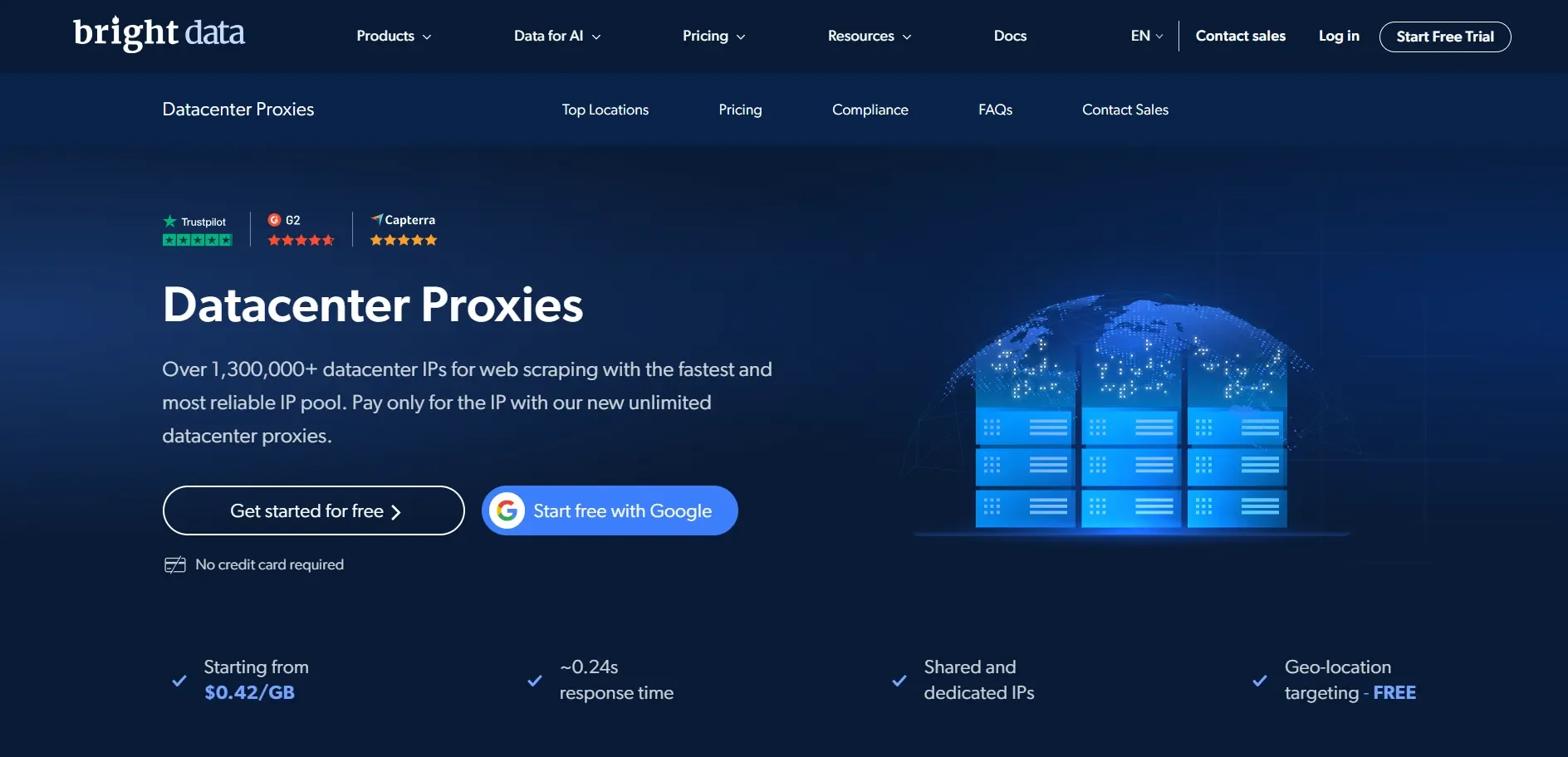
Access over 1.3 million datacenter IPs for lightning-fast, reliable web scraping. With Decodo’s new unlimited datacenter proxies, you pay only for the IPs you use, making it a cost-effective and efficient solution for all your large-scale data collection needs.
At least 50 global locations, with city/country-level targeting, are standard for all proxy services provided by Bright Data. Maintaining the IPs for as long as they remain available, rotating each request, and promptly replacing any failed IPs are just two of Bright Data’s rotation options. The result is a service with a perfect uptime record for all its customers.
However, this flexibility also impacts the price of products and services through add-ons. Costs may increase if you require an IP address that hasn’t been used recently or need to send an unlimited amount of traffic.
The basic pricing package starts at $500, and you get proxies at $0.60 per IP. You may even choose the pay-as-you-go plan to use their services without incurring any upfront costs.
Key Features:
- Unlimited Datacenter Proxy – Brightdata offers an unlimited bandwidth datacenter proxy, with a price point starting from $0.2/IP
- When customers make their first deposit of $500 or more, BrightData will provide them with an additional $500 credit, equivalent to 50% off.
- Bright Data Datacenter proxy network consists of over 770,000 IP addresses from 98 countries.
- Bright Data is the best-performing datacenter proxy, with a success rate of 99.9%, outperforming other IP providers.
- Bright Data datacenter proxy IP network offers top speeds, 99.99% uptime, and a real-time status monitor.
Pricing: Starting at $0.80+/IP
Pros:
- 100% compliant.
- Highly reliable & flexible.
- Fast server speed.
- Seamless Integration with third-party apps & tools.
- Global coverage.
Cons:
- Some regional proxies have minor errors.
- It’s more expensive than other proxies.
Read Bright Data Review for More Information.
5) IPRoyal
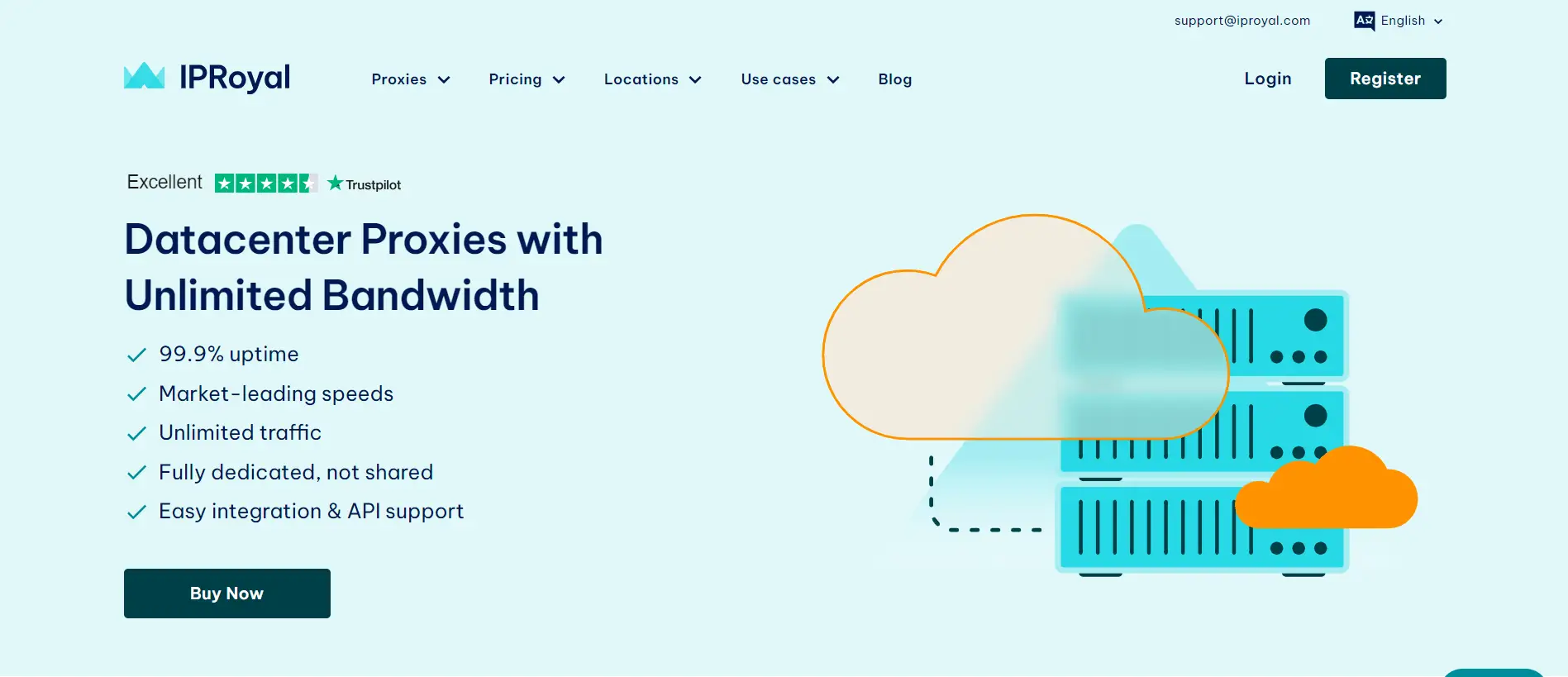
IPRoyal is a reliable provider of residential, datacenter, mobile, and sneaker proxies. Its customer service, competitive pricing, and library of more than 8 million IPs set it apart in a crowded market.
IPRoyal’s impressive datacenter proxies are one of the company’s most valuable offerings. Through its extensive network of datacenter IP addresses, the company offers dependable, fast connections for online tasks.
Businesses of all stripes utilize IPRoyal proxies for market research, data scraping, website testing, privacy, social media, and other purposes. Customers can rest assured knowing that IPRoyal’s live support, available 24/7/365, can quickly resolve any issue.
IPRoyal offers tiered pricing to accommodate varying needs and budgets. For as little as $1.39 per proxy, everyone can use their datacenter proxy services.
Key Features:
- Uptime 99.9%
- Unlimited traffic
- Fastest in market
- IPs Dedicated
- UDP/TCP connections
- Integrate easily, API support.
Pricing: Starting at $1.39/proxy
Pros:
- High user privacy and security.
- Many datacenter proxies for most countries.
- Competitive Pricing
- Using ethical proxies ensures reliability.
Cons:
- No mobile app for Proxy Management
- Free proxies may be slower and less secure
6) Proxy Empire
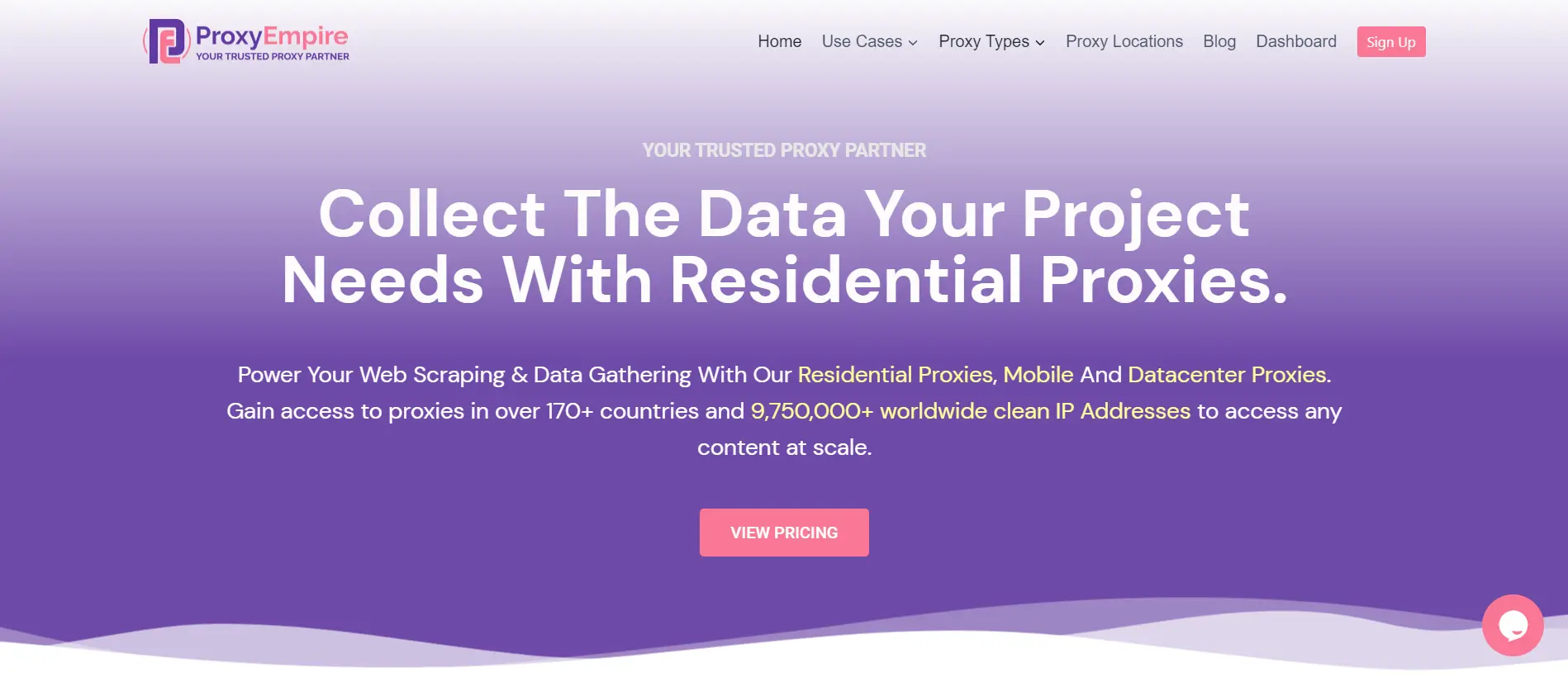
ProxyEmpire’s residential and mobile proxies are among the top datacenter proxies. Their millions of proxies allow users to browse the internet safely, bypass geo-restrictions and firewalls, and scrape data.
You won’t have to pay extra for each individual IP address, unlike with a Datacenter proxy provider. With ProxyEmpire, you’ll only ever pay for the bandwidth you use. While ProxyEmpire offers fewer residential proxies than other entries on this list (5.3 million), it charges less: $45 for 3GB.
ProxyEmpire allows users to try their service for just $1.97 and offers a variety of subscription plans to meet all needs. As a consequence, you can assess the services they offer and determine whether they are suitable for your needs.
Pros:
- Adjusting proxy settings is easy with ProxyEmpire’s interface.
- Use ProxyEmpire to bypass internet filters, access blocked websites, and protect your privacy.
- Unlimited data rollover
- Receive real-time global info quickly.
- Globally access all websites
Cons:
- The brand is less prevalent.
7) NetNut
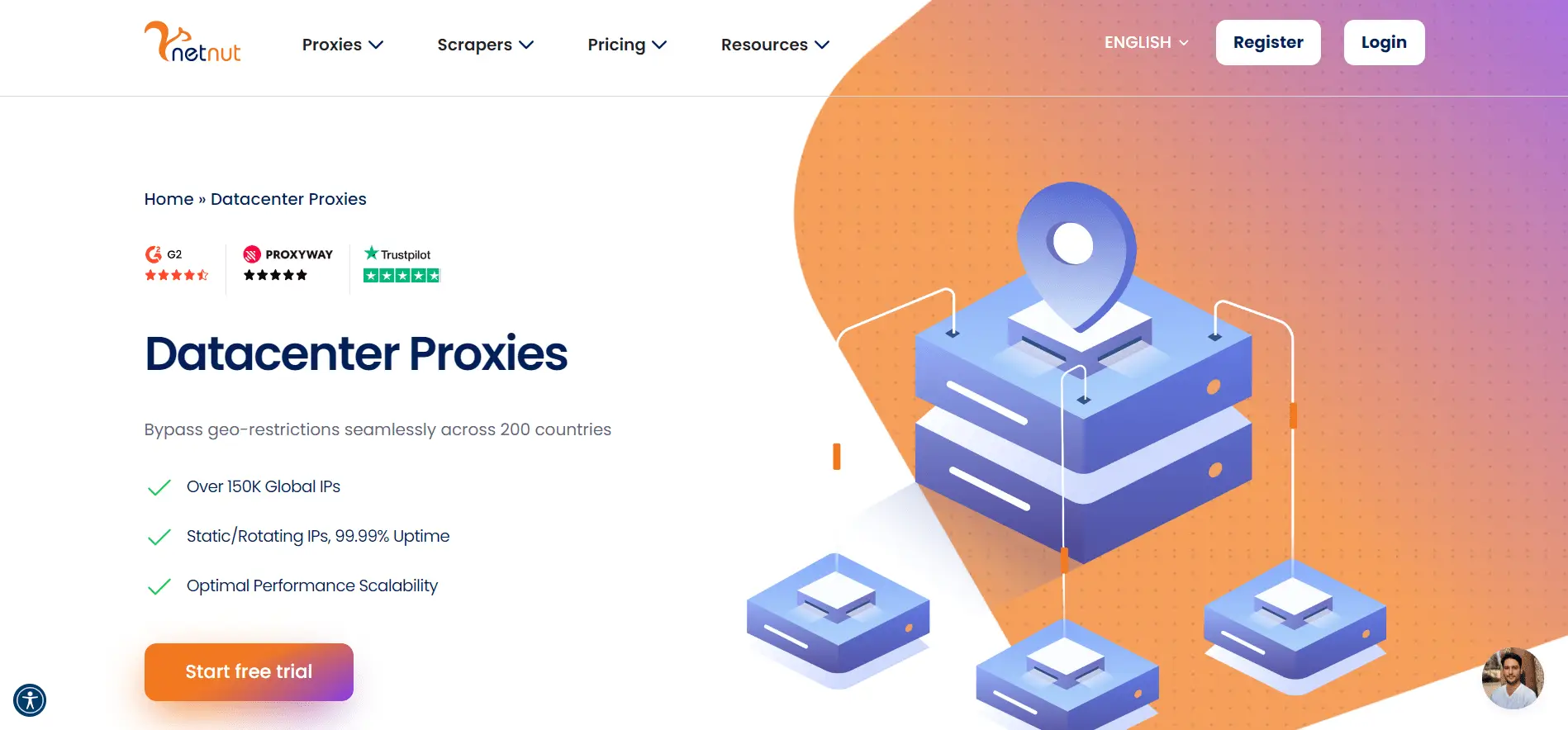
NetNut’s ISP-sourced proxies offer numerous advantages. In essence, they combine the resilience and stealth of residential IPs with the performance and stability of data center IPs.
NetNut has 150K shared datacenter IPs. Multiple users using shared datacenter IPs makes them cheaper than dedicated proxies, as users split the cost of the shared datacenter.
In addition, the company provides 110K+ US datacenters for easier scraping jobs and more than 52 million rotating residential proxies globally, including P2P-sourced IPs. The company’s US datacenter options start at $100 per month for 100GB of bandwidth. No concurrency constraints mean you can operate as many connections as needed.
Pros:
- Effective Scraping Performance
- coverage of 30 nations globally
- Dedicated account manager:
- Superior Session Control
- Great Proxy Pool with 52 million residential IPs
Cons:
- Premium residential proxies are usually pricey.
8) Storm Proxies
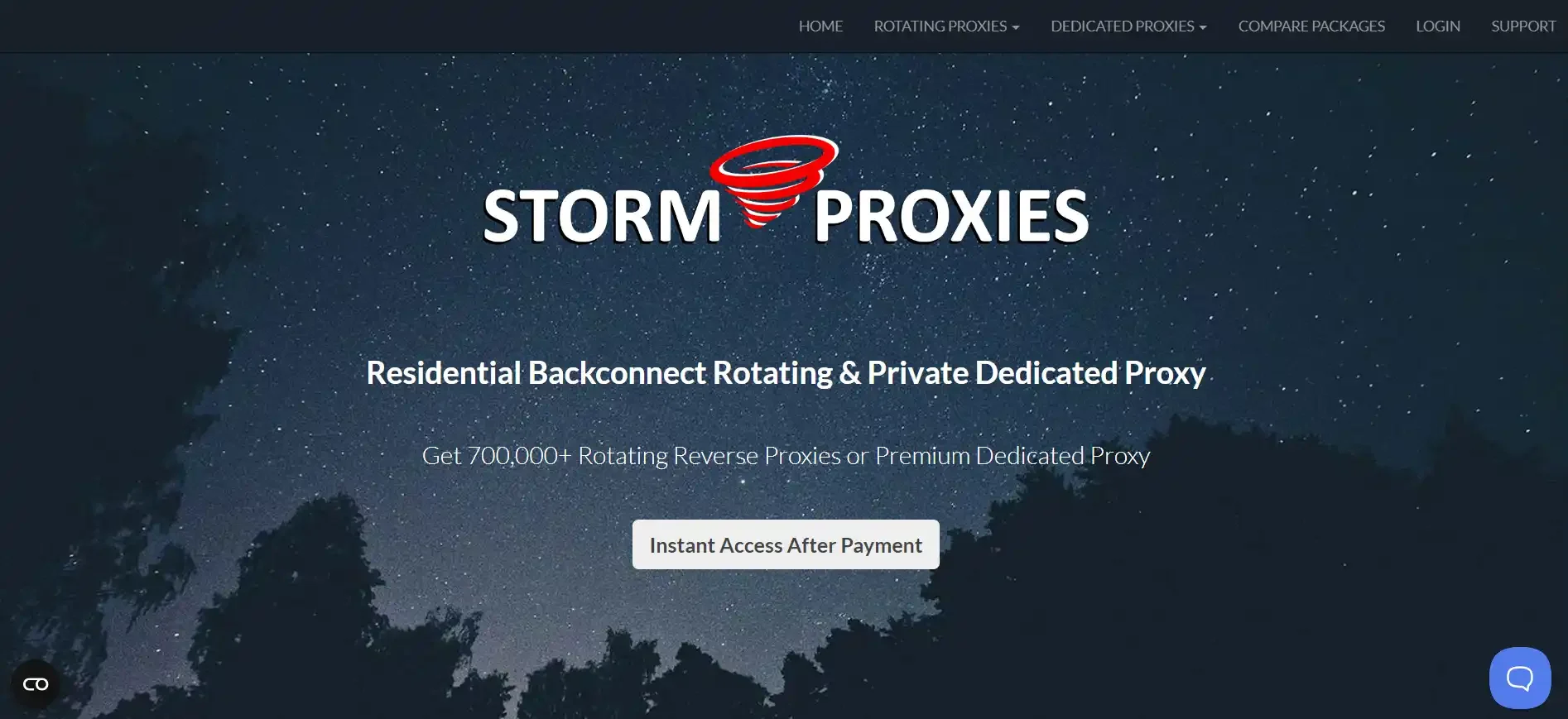
This business’s current offerings include dedicated proxy servers, IT support, and even proxies tailored for use on social media platforms like Facebook and Instagram, as well as ticketing sites.
You are the only user of these datacenter proxies. Apparently hosted on internal servers, Storm Proxies does not reveal the number of IPs under control.
Storm Proxies offers a trio of proxy types. Backconnect rotating proxies, which combine datacenter and residential IPs, are among them, as are rotating residential proxies and private dedicated proxies that provide datacenter IPs.
The IP pool used to generate datacenter proxy addresses consists of over 70.000 IP addresses, the majority of which are located in the US and Europe.
Starting at $14, there are three pricing options: rotating residential proxies (1 port), dedicated IPs (5 proxies), and backconnect type (10 threads). Any plan can be accessed through the first two types of proxy networks.
Pros:
- Very Economical pricing plans
- Simple to Use
- Trial: 24-hour residential proxy refund
- Unlimited bandwidth
- 24/7 support
Cons:
- Geotargeting is quite limited.
- Limited Support
9) Rayobyte
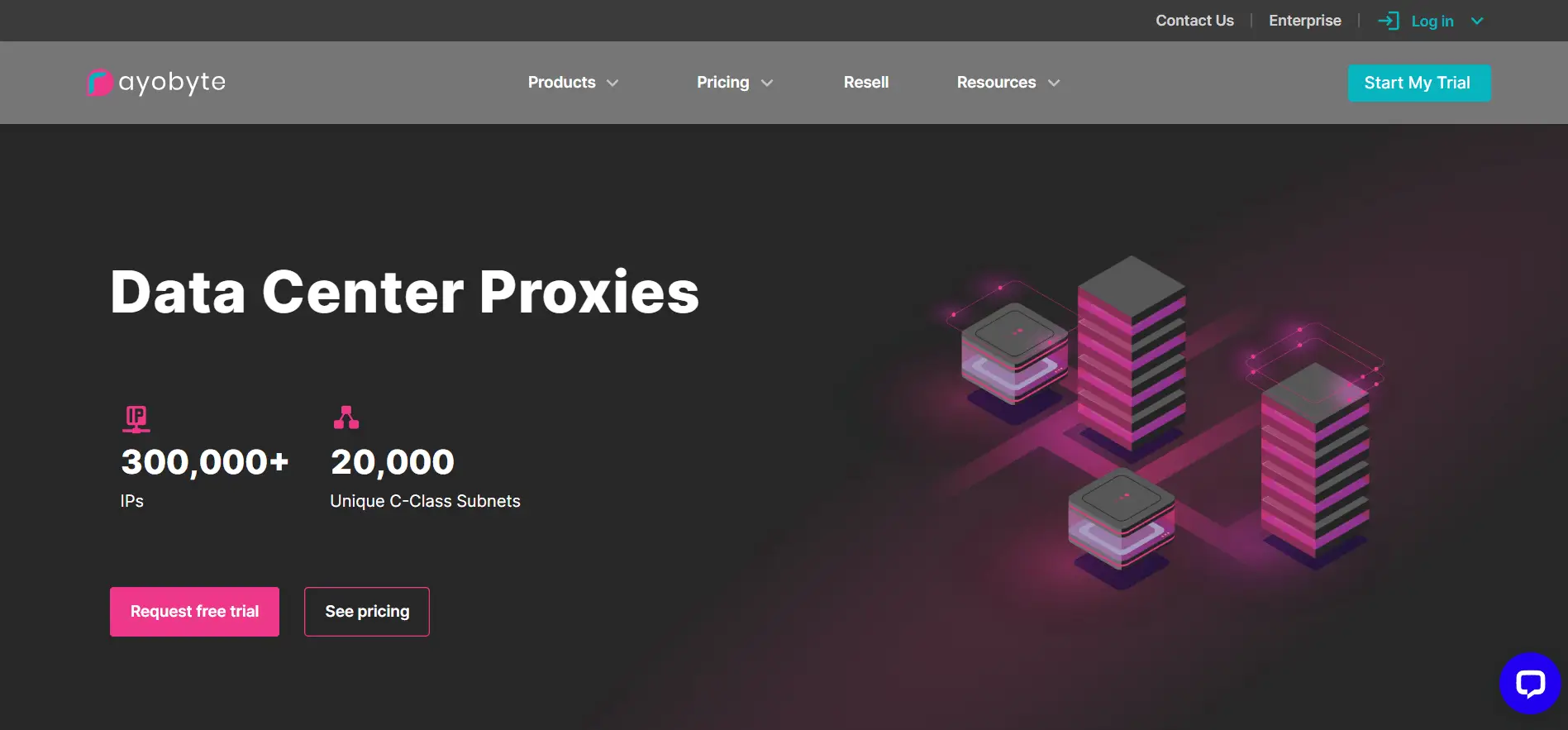
Along with shared and private proxies, Rayobyte provides consistent performance. Users who need virgin IPs for sensitive tasks such as mass account registration or search engine scraping can find them here. Such sensitive actions involve registering many accounts and scraping search engines.
With this service, users can enjoy up to 1 gigabit per second, unlimited bandwidth and threads, and automatic proxy replacements once per month.
Rayobyte provides a robust infrastructure of dedicated, shared, and rotating proxies from datacenters. The service does not restrict the quantity of bandwidth, domains, or threads.
In 26 countries, dedicated address options are available to you. Most of them are based in the United States, but you can also focus on nations in Southeast Asia, South America, and Western Europe.
Rayobyte offers dedicated, semi-dedicated, and rotational datacenter proxy alternatives that benefit individuals and businesses.
Dedicated plans start at $12.50 for 5 IP addresses ($2.50/IP), while shared plans start at $4 for 5 IP addresses ($0.8/IP) or $0.65 for 1 GB.
Pros:
- Fast customer support
- Speedy proxies
- Unlimited bandwidth
- Custom packages
- The proxy pool: 200k+
Cons:
- Suitable for a few uses
- Limited features
10) Infatica
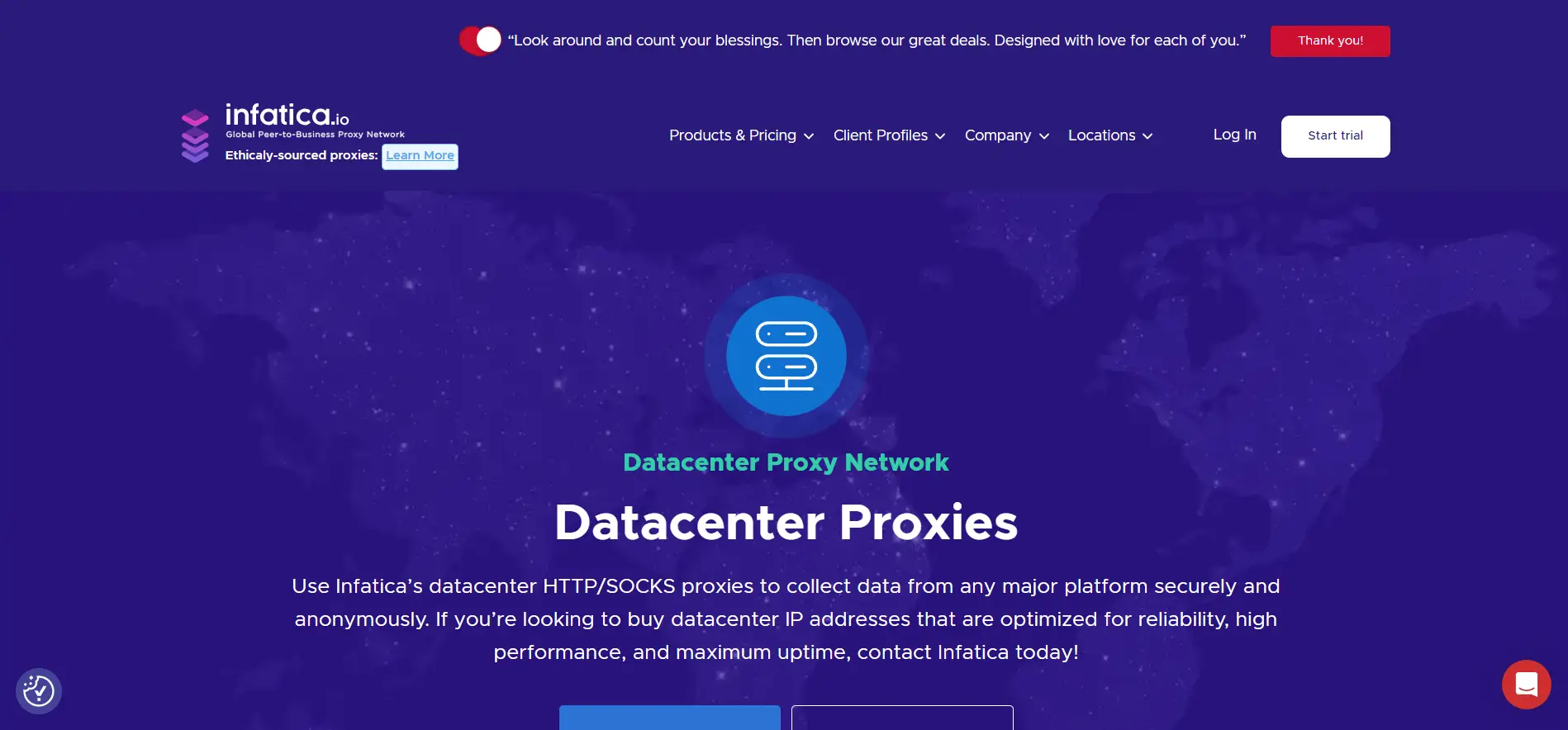
Infatica, a Singaporean proxy service, initially offered only premium residential proxies for sale but has since branched out to include mobile, datacenter, and web scraping APIs. Despite the company’s Asian headquarters and operations, Infatica’s owners and a sizable portion of the team are Russian.
Infatica provides the best web scraping proxy service. Sign up for fresh proxies to avoid sharing your Internet connection with your neighbour. Their proxy pool exceeds 10 million. Data is encrypted end-to-end for privacy and security.
For up to a terabyte of data, Infatica’s price is comparable to or lower than its premium rivals’. Its price decreases significantly, surpassing that of mid-range competitors such as Smartproxy.
Infatica’s pricing is based on a subscription plan that adds fees for data transfer. Plans start at $96.
Pros:
- Different proxy types
- Unlimited bandwidth
- Affordable
- Performance and uptime tracking
- SOCKS5 support
Cons:
- Limited Geotargetting
- Limited Authentication
What are datacenter proxies used for?
The following are some of the most common use cases for datacenter proxies:
1) SEO Monitoring:
A popular use for datacenter proxies is search engine optimization (SEO) monitoring, which involves circumventing IP bans and CAPTCHA systems set by search engines to prevent scraping.
Datacenter proxies can greatly benefit competitor analysis, rank tracking, keyword research, and many other notable SEO monitoring use cases.
2) Scraping Public Sites:
Datacenter proxies are most commonly used for web scraping, a process that involves extracting publicly accessible information from web pages. By using proxy servers, online scrapers can circumvent IP restrictions, enhance anonymity, access region-specific content, and accelerate the collection of public data.
Public data can be efficiently gathered using datacenter proxies and well-established online scraping methods.
3) Testing/Deploying Apps:
Datacenter proxies facilitate app deployment, including on mobile devices. Proxy servers guarantee cross-platform compatibility and optimal performance when the program communicates with third-party resources.
When testing an app, proxies can ensure that localized features work as expected. Location-sensitive services, such as those that restrict access to specific regions or provide content based on the user’s current location, can also be tested. In parallel testing, a proxy can assign unique IP addresses to each client rather than sharing a single pool.
4) Price Monitoring:
By monitoring product and service prices, price monitoring sheds light on the market and competitors’ tactics at scale.
Many industries, including e-commerce, hotels, and travel, use datacenter proxies to monitor costs. To access reliable public online data, optimize sales and prices, and reprice goods and services in response to trends or market demand, datacenter proxies circumvent IP address bans and CAPTCHA.
5) Social Media Account Management:
When it comes to managing your social media accounts, datacenter proxies are really useful. They provide an additional layer of protection that masks your true IP address and, in the long run, your identity. Furthermore, proxies enable the anonymous tracking of rivals’ social media accounts, geo-targeting, and bypassing IP blocks. Similarly, libraries and technologies like Selenium and Puppeteer can automate social media with datacenter proxies.
6) Buying Limited Products:
Buying things with a limited supply is a common use case for datacenter proxies. It can be challenging to obtain certain products, such as high-end clothing, sneakers, artwork, vintage goods, or concert tickets, due to their limited supply and intense demand. Suppose a store puts restrictions on things like the maximum size of a customer’s shopping cart or the number of items a single user can buy. In that case, datacenter proxies can help users get around these restrictions.
Search engine scraping, social media account management, trademark protection, and market research are just a few of the many applications that can benefit from using datacenter proxies.
7) Geo-restricted access
Companies obtain and evaluate market data to better understand their customers’ buying habits, expectations, and current competitors. To gather current, reliable data on their target market, they use proxies to access and extract data from web platforms.
Geo-blocking is a common issue that hinders monitoring competitors’ activity.
8) Faster speeds
Because they obtain their IP addresses from a distant cloud server, Datacenter Proxies are renowned for their lightning-fast performance. Datacenter IP addresses, unlike residential IP addresses, may be more visible to websites and thus more likely to be blacklisted.
9) Web scraping
To avoid having users’ IP addresses blacklisted, several datacenters employ proxies that randomly assign new addresses to them after each request or at regular intervals.
Proxies are necessary for successful web scraping. To prevent further scraping, the target website may identify your activity as suspicious and block your IP address. This is because web scraping involves many queries to a server from a single IP address.
10) An Affordable Solution
Datacenter proxies may be a cost-effective option for businesses seeking proxy services. Because of their infrastructure, they are less expensive than proxies hosted on personal computers or mobile devices.
To save money on maintenance, proxy servers in the datacenter do not use residential or mobile networks. Because of their low cost, datacenter proxies are the preferred choice for businesses with high proxy usage or limited budgets. Additionally, datacenter proxies allow you to customize the bandwidth and concurrent connection prices.
Also, Read:
FAQs
Are proxies illegal
Whether and in what jurisdictions a proxy server is utilized determines whether its use is lawful. Proxy servers are generally not illegal, but using them can pose risks due to varying restrictions across countries.
What is the fastest datacenter proxy?
When it comes to proxy services, Oxylabs is often regarded as one of the industry leaders in terms of speed. Oxylabs offers the fastest and most reliable connections for data collection and web scraping, with a response time of 0.6 seconds for both residential and high-speed datacenter proxies, meeting the industry standard.
How to Select the Best Datacenter Proxy?
As a quick recap, consider whether you need a shared or private proxy for your datacenter. Next, compare the features offered by each provider, including their prices, IP pool sizes, and overall service performance.
Are datacenter proxies detectable?
Datacenter proxies conceal your true location and IP address, but they can be easily identified because their web requests reveal the datacenter IP source. This data is sufficient to warrant blocking a datacenter proxy IP address.
Conclusion
Consider giving the service a try before signing up for a paid subscription. To avoid being identified as a web scraper, you need to be aware of the different techniques now used by websites. Some advice is provided to help you avoid becoming stuck while scraping.
Datacenter proxies can be used for both professional and non-professional purposes. They’re speedy, affordable, and often offer unlimited data transfer. However, IP addresses within the datacenter may be easily located. Finding the best datacenter proxy service requires thinking about your budget, the functionality you need, and the constraints of your specific project.

